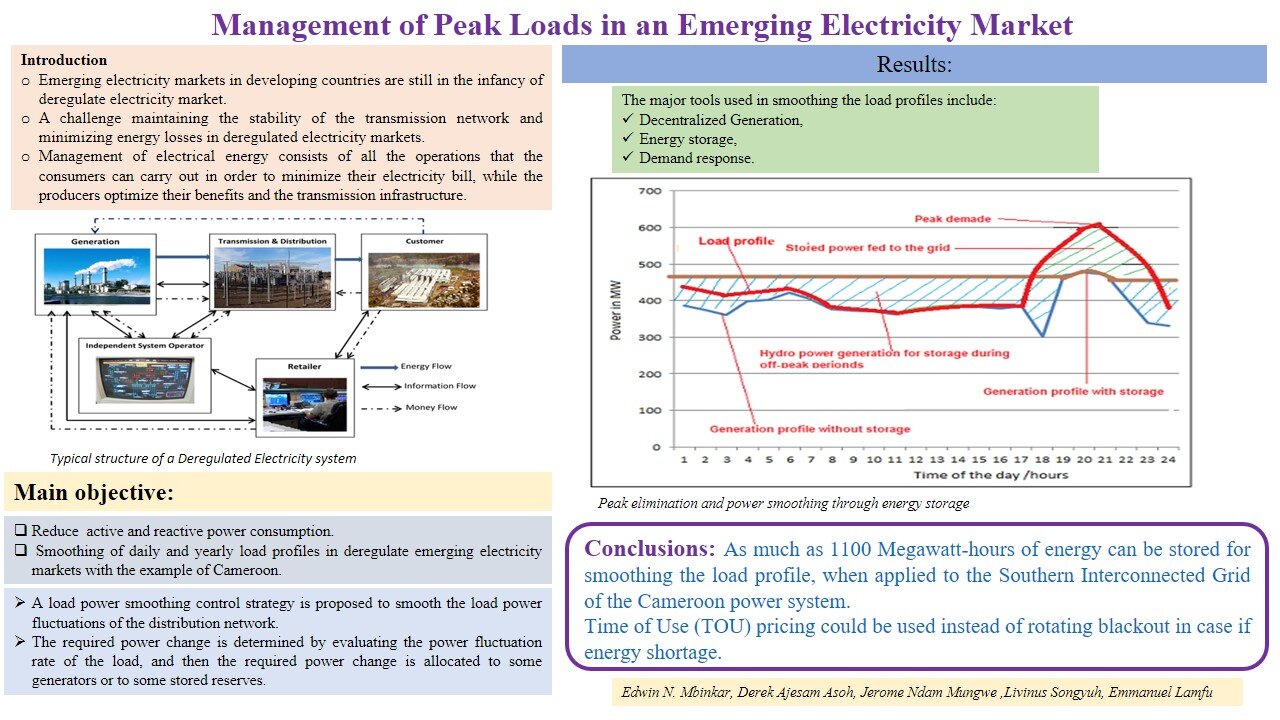 Open Access
Open Access
ARTICLE
Management of Peak Loads in an Emerging Electricity Market
1 Laboratoire de Génie Electrique, Mécatronique et Traitement du Signal, ENSPY, Université de Yaoundé I, Yaounde, Cameroun
2 Department of Electrical and Electronic Engineering, National Higher Polytechnic Institute (NAHPI), University of Bamenda, Bamenda, Cameroon
3 Department of Electrical and Power Engineering, Higher Technical Teacher Training College (HTTTC), University of Bamenda, Bamenda, Cameroon
4 Mekin Hydroelectric Development Corporation, Meyomessala, Cameroon
5 ENEO Cameroun S.A., Douala, Cameroon
* Corresponding Author: Edwin N. Mbinkar. Email:
Energy Engineering 2022, 119(6), 2637-2654. https://doi.org/10.32604/ee.2022.023419
Received 25 April 2022; Accepted 18 July 2022; Issue published 14 September 2022
Abstract
An electricity market is a trading platform provided by the actors in the electricity sector to sell and buy electricity while maintaining the stability of the transmission network and minimizing energy losses. The management of electrical energy for rational use consists of all the operations that the consumers can carry out in order to minimize their electricity bill, while the producers optimize their benefits and the transmission infrastructure. The reduction of active and reactive power consumption and the smoothing of daily and yearly load profiles are the main objectives in this work. Many developed countries already have properly functioning electricity markets, but developing countries are still in their infancy of deregulated electricity markets. The major tools used in smoothing the load profiles include decentralized generation, energy storage and demand response. A load power smoothing control strategy is proposed to smooth the load power fluctuations of the distribution network. The required power change is determined by evaluating the power fluctuation rate of the load, and then the required power change is allocated to some generators or to some stored reserves. Otherwise, the consumers are made to curtail their power consumption. The ideas proposed in this work provide important opportunities for energy policy makers and regulators. These ideas would only be feasible if there exists real-time communication among the actors in the electricity market. The results indicate that as much as 1100 Megawatt-hours of energy can be stored for smoothing the load profile, when applied to the Southern Interconnected Grid of the Cameroon power system; and that Time of Use (TOU) pricing could be used instead of rotating blackouts in case of energy shortage.Graphic Abstract

Keywords
Cite This Article
 Copyright © 2022 The Author(s). Published by Tech Science Press.
Copyright © 2022 The Author(s). Published by Tech Science Press.This work is licensed under a Creative Commons Attribution 4.0 International License , which permits unrestricted use, distribution, and reproduction in any medium, provided the original work is properly cited.


 Submit a Paper
Submit a Paper Propose a Special lssue
Propose a Special lssue View Full Text
View Full Text Download PDF
Download PDF Downloads
Downloads
 Citation Tools
Citation Tools